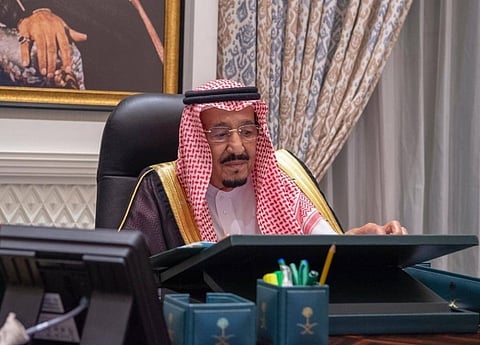

The Custodian of the Two Holy Mosques King Salman bin Abdulaziz Al Saud, Prime Minister, chaired the Cabinet's virtual session on Tuesday.
At the outset of the session, the Cabinet was briefed on the contents of the recent meetings aimed to strengthen and develop relations with many friendly and brotherly countries in various fields, and to continue promoting the Kingdom of Saudi Arabia's position and role at regional and international levels.
The Cabinet reviewed a number of reports on the latest regional and international developments, reiterating the Kingdom of Saudi Arabia's continuous work with the United Nations to bring peace to Yemen, as this is a priority for the Kingdom, with holding its full right to defend its security and citizens in accordance with international humanitarian law and its customary rules.
In a statement to the Saudi Press Agency (SPA), Acting Minister of Media Dr. Majid bin Abdullah Al-Qasabi disclosed that the Cabinet stressed the contents of the Permanent Mission of the Kingdom of Saudi Arabia to the United Nation's letter sent to the UN Security Council in regard to the latest attack committed by the terrorist Iran-backed Houthi Militia against the Eastern Province, Jazan and Najran in the Kingdom of Saudi Arabia. It called upon the Security Council to assume its responsibility towards the Iran-backed Houthi militias and their weapons supplier and to deny the resources which fund their cross-border acts of aggression that threaten international peace and security and undermine international efforts to reach a comprehensive political solution in Yemen.
The Cabinet reviewed the Kingdom's participation in the 156th session of the Council of the Arab League. This includes the condemnation of Israeli attacks in Jerusalem which was expressed during the meetings held on the sidelines of the session. This is in addition to stressing the importance of imposing the mechanisms for a rapid and comprehensive inspection of all Iranian nuclear sites and strengthening joint Arab coordination to address any interference in the internal affairs of Arab countries.
He added that the Cabinet reviewed the latest developments of the COVID-19 pandemic locally and globally, as well as the latest statistics and indexes of the health situation in the Kingdom of Saudi Arabia in light of the decrease in COVID-19 cases and the increase in the number of citizens and residents receiving the vaccine, where the total number of administered vaccine doses is about 40 million. It stressed the importance of adhering to preventive measures and completing the COVID-19 doses to protect from severe and critical complications of COVID-19.
The Cabinet was briefed on a number of issues on its agenda, and issued the following decisions:
First:
The Cabinet authorized the Minister of Energy – or his representative – to discuss and sign with the Japanese side two draft memoranda of cooperation between the Ministry of Energy of the Kingdom of Saudi Arabia and the Ministry of Economy, Trade and Industry of Japan in the fields of hydrogen, carbon recycling and circular economy of carbon.
Second:
The Cabinet authorized the President of the Saudi Data and Artificial Intelligence Authority (SDAIA) – or his representative – to discuss and sign with the International Telecommunication Union (ITU) a draft cooperation agreement between the Saudi Data and Artificial Intelligence Authority in the Kingdom of Saudi Arabia and the International Telecommunication Union.
Third:
The Cabinet authorized the Chairman of the Board of Directors of the Education and Training Evaluation Commission (ETEC) – or his representative – to discuss and sign with the Egyptian side a draft memorandum of cooperation between the Education and Training Evaluation Commission of the Kingdom of Saudi Arabia and the National Authority for Quality Assurance of Education and Accreditation of the Arab Republic of Egypt in the field of quality and accreditation.
Fourth:
The Cabinet approved an establishment of "General Authority for Defense Development", which enjoys legal entity and financial and administrative independence and is linked to the Prime Minister. The authority defines the objectives of research, development and innovation activities related to the fields of technology and defense systems as well as setting its policies and strategies.
Fifth:
The Cabinet accredited a final account of the Water and Electricity Regulatory Authority (previous) for a fiscal previous year.
Sixth:
The Cabinet approved Personal Data Protection System.
Seventh:
The Cabinet approved a technical linkage among the Ministry of Interior; the Ministry of Municipal and Rural Affairs and Housing, and the Saudi Data and Artificial Intelligence Authority (SDAIA) for exchanging information and data related to neglected or damaged vehicles – at the public squares, parking lots, streets or roads – and their owners in order to verify no security restrictions before taking any measure regarding these vehicles.
Eighth:
The Cabinet approved Anti-Begging System.
Ninth:
The Cabinet approved a guidebook to propose enactment of provisions of administrative violation and its penalty.
Tenth:
The Cabinet approved that the Saudi Ports Authority – in agreement with the Public Investment Fund – to undertake marine infrastructure projects in order to develop the cruise ship sector in the Kingdom.
Eleventh:
The Cabinet approved a number of promotions at (15-14) Rank. The Cabinet also reviewed a number of general topics on its agenda. The Cabinet took the necessary measures regarding these topics.
